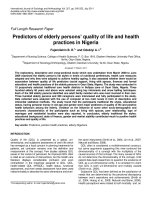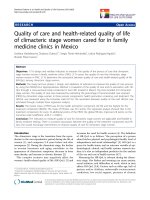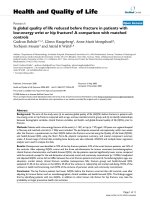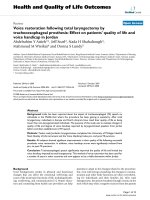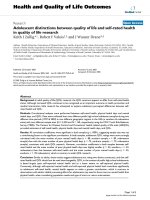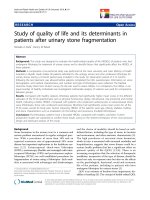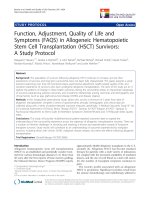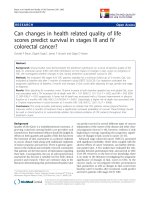Quality of life and health profile in individuals with parkinsons
Bạn đang xem bản rút gọn của tài liệu. Xem và tải ngay bản đầy đủ của tài liệu tại đây (196.43 KB, 7 trang )
International Journal of Advanced Engineering Research and
Science (IJAERS)
Peer-Reviewed Journal
ISSN: 2349-6495(P) | 2456-1908(O)
Vol-8, Issue-7; Jul, 2021
Journal Home Page Available: />Article DOI: />
Quality of life and health profile in individuals with
Parkinson's
Cristianne Confessor Castilho Lopes1, Thaine Andressa Ruschel2, Daniela dos Santos3,
Marilda Morais da Costa4, Paulo Sergio Silva5, Tulio Gamio Dias6, Eduardo Barbosa
Lopes7, Lucas Castilho Lopes8, Laisa Zanatta9, Joyce Kelly Busoli Jardim10, Caroline
Lehnen11, Vanessa da Silva Barros12, Liamara Basso Dala Costa13, Heliude de Quadros e
Silva14, Youssef Elias Ammar15
1
University of the Region of Joinville - Joinville - SC
High Valley University of Rio do Peixe - Hunter - SC
4
Lutheran Educational Association - Faculty IELUSC - Joinville - SC
5
Uni Sociesc/Joinville - SC
6
USP School of Arts, Sciences and Humanities – São Paulo - SP
7,9,10,11,12,13,14
Alto Vale University of Rio do Peixe - Caỗador - SC
8
Federal University of Santa Catarina - SC
15
University of the South of Santa Catarina/Tubarão – SC
2,3
Received:02 Jun 2021;
Received in revised form: 28 Jun 2021;
Accepted: 09 Jul 2021;
Available online: 17 Jul 2021
©2021 The Author(s). Published by AI
Publication. This is an open access article
under the CC BY license
( />Keywords— Physiotherapy.
Quality of life.
www.ijaers.com
Parkinson's.
Abstract — Parkinson's disease is a pathology that affects the central
nervous system (CNS) progressively causing its degeneration. This results
in a decrease in the dopamine hormone, which is the neurotransmitter
responsible for normal brain activity, its decrease directly linked to the
appearance of the pathology. Therefore, it affects the quality of life, which
is represented by the degree of satisfaction found in family, loving, social
and environmental life. As a treatment, physiotherapy plays a fundamental
role in improving the quality of life in order to relieve symptoms and
disease progression. The aim of the study was to analyze the quality of life
and the health profile of the individual with Parkinson's disease. The
research is descriptive, with a cross-sectional design and a quantitative and
qualitative approach. The sample consisted of 11 individuals with
Parkinson's. Data collection was carried out through a mixed online
questionnaire, developed through Google Docs®, containing information
and general characteristics of the participants, a questionnaire on the
health profile of Nottingham (PSN) and finally a questionnaire that
evaluated the quality of individuals with Parkinson's (PDQ-39). The PSN
questionnaire brought an average of 13.7 points indicating a worse
perception of health and the PDQ-39 presented 45.8% in the average of the
final score. With this study, it was possible to note that the quality of life of
the participants is greatly affected due to the symptoms, degree and
progression of the disease.
Page | 186
Cristianne Confessor Castilho Lopes et al.
I.
International Journal of Advanced Engineering Research and Science, 8(7)-2021
INTRODUCTION
Parkinson's disease is a pathology that affects the
central nervous system (CNS) causing its degeneration
progressively leading to the decrease of the hormone
dopamine, which is the neurotransmitter responsible for
the normal activity of the brain. Its decrease is directly
linked to the emergence of the pathology(GOULART et
al., 2004).
Among the alterations present in Parkinson's
disease are: tremor, described as at rest and usually
involves mainly the hands; stiffness that leads to a
limitation in range of motion and resistance to movement;
bradykinesia due to slowing of movements; postural
instability and musculoskeletal changes altering balance
and causing postural deviations(SILVA; DIBAI FILHO;
FAGANELLO, 2011).
These postural deviations lead to a decrease in
lung expansion due to chest rigidity, which, in turn,
compromises the natural movement of breathing, leading
to progressive limitation of lung ventilation (PEREIRA,
2006).
Such changes require physical therapy treatment
so that there is a process of rehabilitation of patients with
Parkinson's disease. This treatment is developed with
motor exercises, such as, for example, training in gait and
activities of daily living, relaxation therapy and breathing
exercises(ARAÚJO, 2007).
With this, the compromised quality of life can
present a decline according to the symptoms, degree of the
disease and its progression, therefore, it is necessary to
elaborate an adequate intervention strategy in order to
minimize the symptoms and slow down the disease
progression, through knowledge of factors related to the
perception of quality of life (SILVA; DIBAI FILHO;
FAGANELLO, 2011).
Due to all the changes mentioned above, it is
possible to observe the difficulty that people with
Parkinson's disease have when it comes to quality of life
and functional independence. Thus, the general objective
of this research is to analyze through questionnaires if
there is really a change in the quality of life and how this
affects the lives of these individuals.
Taking into account the characteristics of the
pathology and the above, the following question arises: Is
there a decrease in the quality of life of the individual with
Parkinson's? Is it possible to see which changes are present
in these people's lives, measuring through specific
questionnaires for this pathology?
In view of this, it motivated the choice of the
research topic, as it is of great importance to collect data to
www.ijaers.com
analyze the quality of life of these individuals and how
they behave in the situation.
Thus, the general objective of the research was to
evaluate the quality of life and health profile in individuals
with Parkinson's disease. The specific objectives were to
assess the quality of life of these individuals and their
health profile.
II.
METHODS
TYPE OF RESEARCH
The survey is a descriptive one, with a crosssectional design and a quantitative-qualitative approach.
As for the goals
The study was defined as descriptive and with a
quantitative approach. In order to demand from the
investigator information about what he wants to study,
descriptive research intends to describe the facts and
phenomena of a given reality. Seeks to answer questions
without interfering with reality, observes the motivation
for that action , and may aim to become familiar with a
phenomenon or discover a new perception or analyze
points of view from different sources(FONSECA, 2012).
As for technical procedures
For technical procedures, the study was
characterized as a cross-sectional research, which is
carried out through data collection that can be carried out
through interviews, observations or search for information
or data in databases and documents (SILVEIRA, 2009).
As for the approach
Finally, presenting a quantitative approach, which
is based on the use of measurable data with the use of
questionnaires, measurement and precision calculations,
elaboration of indexes and scales and statistical procedures
explaining its existence, relationship or influence on
another variable, with concern with what is common to
most situations. It seeks to analyze the frequency of
occurrence to measure the veracity or not of what is being
investigated(FONSECA, 2012).
This type of approach is tied to the formulation of
hypotheses through verification, demonstration, tests and
mathematical logic that require a relationship between
cause and effect to support the conclusion in statistical
data and thesis. (ZAMBELLO et al., 2018).
Sample and Location
The sample consisted of 11 individuals, of both
sexes, aged between 40 and 80 years and diagnosed with
Parkinson's disease.
Page | 187
Cristianne Confessor Castilho Lopes et al.
International Journal of Advanced Engineering Research and Science, 8(7)-2021
Ethical procedures
The project was submitted for proper approval by
the Ethics Committee of the Alto Vale of Rio do Peixe
University (UNIARP) according to the recommendations
of resolution 466/12 of the national health council for
scientific research with human beings.
After proper approval, through opinion number
4,143.053/2020, data collection started, through the
dissemination of the survey on the social networks
Facebook®, Instagram® and Whatsapp®.
Procedures for data collection
To meet the objectives proposed in this study,
data collection was performed through a mixed online
questionnaire, developed on the Google Docs® platform,
available
at
this
link< />The capitation of the participants took place through
the dissemination of the questionnaire link on the
academic and supervisor's social networks Facebook®,
Instagram® and Whatsapp®. The collection period took
place between the months of July to September/2020.
The evaluation consisted of questions referring to the
general characteristics of the participants, applying the
questionnaire on the Nottingham Health Profile (PSN) and
another that assessed the quality of life (PDQ-39) in
individuals with Parkinson's. These were answered by the
participants with Parkinson's, and if the participant could
not answer the questionnaire alone, it could be helped by a
family member or even a professional responsible for their
care. The questionnaires that were used are described
below:
1.
Questionnaire of general characteristics of
participants:
It is a targeted questionnaire containing information
that characterizes the participants, such as: name; age;
education; physiotherapeutic treatment is performed;
among other questions, being closed and multiple choice.
2.
Nottingham
(PSN):
Health
Profile
Questionnaire
It is a comprehensive questionnaire to assess quality
of life, originally developed to assess the quality of life in
patients with chronic diseases. It uses an easy-to-interpret
language and offers a simple measure of the individual's
physical, social and emotional health, being considered
clinically valid to distinguish patients with different levels
of dysfunction and to detect important changes in the
patient's health status over time. It refers to a selfadministered questionnaire, consisting of 38 items, based
on the disability classification described by the World
www.ijaers.com
Health Organization, with answers in the yes/no format.
Items are organized into six categories that include energy
level, pain, emotional reactions, sleep, social interaction,
and physical skills(TEIXEIRA-SALMELA et al., 2004).
3.
Quality of Life Questionnaire for Individuals
with Parkinson's (PDQ-39):
It is a widely used questionnaire and a specific scale
for this pathology. It consists of 39 questions and divided
into domains, namely: mobility, consisting of 10 items;
daily life activity, with 6 items; emotional well-being, 6
items; stigma of the disease, 4 items; social support; 3
items; cognition, 4 items; communication, 3 items; and
physical bodily discomfort, with 3 items(BRIDGES et al.,
2017).
As an alternative answer, it presents five options:
“Never”; "rarely"; "sometimes"; “often” and “always”
(VASCONCELOS et al., 2015). The score ranges from 0
to 4, which is never equal to 0; every now and then it
equals 1; sometimes equals 2; often equals 3; always
equals 4(BRIDGES et al., 2017).
The overall score ranges from 0 to 100, where 0
means less problem and 100 means a higher level of
problem and worse quality of life. This score is divided by
the domains mentioned above. In the emotional well-being
domain, the score ranges from 0 to 24, which brings
questions about how you felt in the last month; in the
Stigma domain, where questions about situations that the
person lived in the public are addressed, the score ranges
from 0 to 16; in the social support domain, it ranges from 0
to 12; in the cognition domain, it ranges from 0 to 16,
addressing issues related to concentration, memory, among
others; in the communication item, it ranges from 0 to 12
and aims to assess whether the individual has the ability to
communicate; in the body discomfort domain, it ranges
from 0 to 12(BRIDGES et al., 2017).
The score for each domain is calculated according to
the following formula: the sum of the patient's scores for
each question, divided by the result of the multiplication of
4 (the maximum score for each question) and the total
number of questions in each division. Your result should
be multiplied by 100. The total score ranges from 0 to 100,
where 0 means less problem and 100 means a higher level
of problem and consequently worse quality of life(LANA
et al., 2007).
III.
RESULTS AND DISCUSSION
The sample consisted of 11 patients, aged
between 70 and 80 years (45.5%), with complete higher
education (54.5%), married or in a stable relationship
(63.6%) who manifested the onset of symptoms between
Page | 188
Cristianne Confessor Castilho Lopes et al.
International Journal of Advanced Engineering Research and Science, 8(7)-2021
60 and 70 years (63.6%), with a time of 5 to 10 years since
the diagnosis of the disease (63.6%), practitioners of
physical activity (90.9%) and physiotherapy ( 81.8%),
these data appear in Table 1 below.
Table1 – Sample profile.
N
%
Feminine
3
27.3
Male
8
72.7
40 to 50 years
1
9.1
51 to 60 yearsold
two
18.2
61 to 70 yearsold
3
27.3
71 to 80 yearsold
5
45.5
incompleteelementaryschool
two
18.2
Complete primaryeducation
two
18.2
Incomplete high school
1
9.1
completehighereducation
6
54.5
Married/consensual union
7
63.6
Divorced
4
36.4
two
18.2
41 to 50 yearsold
1
9.1
51 to 60 yearsold
1
9.1
61 to 70 yearsold
7
63.6
between 1 to 5 years
3
27.3
between 6 to 10 years
7
63.6
between 11 to 15 yearsold
1
9.1
Yea
10
90.9
No
1
9.1
Yea
9
81.8
No
two
18.2
Gender
Age
education
Marital status
Onsetofsymptoms
30 to 40 years
diseasediagnosis time
practicephysicalactivity
Performphysiotherapy
Source: Author (2020).
Table 2 shows the individual results obtained
through the Nottingham Health Profile Questionnaire,
where the maximum score is 38 points. When the score is
www.ijaers.com
closer to zero, it is indicative of the worst perception of
health, and the closer to 38 the score, the better is the
perception of health. Through the results, it is possible to
Page | 189
Cristianne Confessor Castilho Lopes et al.
International Journal of Advanced Engineering Research and Science, 8(7)-2021
observe that the sample reached an average score of 13.7
(±8.1) being indicative of a worse perception of health.
The individual score is shown in Table 2 and Graph 1.
data also found a worse perception of quality of life in
individuals with Parkinson's when compared to adults and
the elderly.
The concept of quality of life is related to several
elements within self-esteem and personal wellbeing and
encompasses several aspects such as functional capacity,
socioeconomic level, emotional state, social interaction,
intellectual activity, self-care, family support, lifestyle,
among other factors. Its variable is the sociocultural level,
age group and individual personal aspirations(VECCHIA
et al., 2005).
Table.2:– Score from the Nottinghan Health Profile (PSN)
questionnaire.
In general, quality of life is represented by the
degree of satisfaction found in family, love, social and
environmental life, and with the changes resulting from the
disease, there is a decrease in quality of life, resulting in
limitation of activities and partial or total dependence
(SILVA; DIBAI FILHO; FAGANELLO, 2011).
The results presented by the sample corroborate
the work by Goulart et al. (2004), who carried out a study
evaluating the functional performance and quality of life
(PSN) among adults and elderly individuals and a group
with Parkinson's patients, thus, the final analysis of the
Participant
Individual score
A
17
B
15
C
5
D
17
E
4
F
19
G
17
H
5
I
30
J
5
K
17
Source: Author (2020).
Graphic 1 – Score from the Nottinghan Health Profile (PSN) questionnaire.
NOTTINGHAM HEALTH PROFILE (PSN)
35
30
25
20
15
10
5
0
A
B
C
D
E
F
G
H
I
J
K
Subtitle: Individual Score
Source: Author (2020).
Table 3 shows the results obtained through the
PDQ-39 questionnaire, in which the overall score values
range from 0 to 100, where 0 means less problem and 100
means a higher level of problem, and consequently worse
quality of life. It is possible to observe that the evaluated
items were presented at a medium level, representing a
www.ijaers.com
regular quality of life, with 45.8% in the final score
average.
The dimensions with the highest score were
mobility and social support with 50%, activity of daily
living with 55.4%, and body discomfort with 58.3%.
Page | 190
Cristianne Confessor Castilho Lopes et al.
International Journal of Advanced Engineering Research and Science, 8(7)-2021
The quality of life of these individuals and their
impairment may decline according to the symptoms, the
degree of the disease and its progression, thus, it is
necessary to develop an adequate intervention strategy in
order to minimize symptoms and slow down the
progression of the disease, through knowledge of factors
related to the perception of quality of life (SILVA; DIBAI
FILHO; FAGANELLO, 2011).
Thus, this individual's mental and emotional
impairment is directly affected according to the evolution
and secondary complications of the disease, resulting in a
worsening in the quality of life and in his level of capacity.
Because of this, by understanding the stage of the disease
and seeking the appropriate treatment, it is necessary to
maintain and improve the quality of life, aiming at the
physical and psychological well-being of those who have
the disease(VASCONCELOS et al., 2015).
With the evolution of the disease, new changes
arise that lead to compromised quality of life within other
dimensions of the questionnaire, such as motor symptoms,
cognition, bodily discomfort, emotional well-being and
communication. Thus, the dimensions of activity of daily
living and cognition showed a difference between the mild
and severe groups, and moderate and severe(NAVARROPETERNELLA; MARCON, 2012).
Disorders that detract from the perception of
quality of life are related to the development of motor
activities, thus, the two domains that presented the highest
levels of impairment were mobility and the activity of
daily living, involving situations of leisure or bathing,
where the motor support must be adequate (SILVA;
DIBAI FILHO; FAGANELLO, 2011).
In the study carried out by Souza et al.,
(2007)which aimed to assess the usefulness of the
questionnaire in question, comparing groups of patients
with and without motor fluctuation, found a higher score in
the mobility, activity of daily living, communication and
body discomfort domains in the group of patients with
motor fluctuation. Thus, when compared to patients with
more than 5 years of disease evolution and patients with 5
years or less of the disease, the first group shows a worse
score in relation to the PDQ-39, when compared to the
first years of the disease. Thus, the results presented by the
sample confirm the study by this author.
Table 2 – Score result of the Quality-of-Life Questionnaire
for Individuals with Parkinson (PDQ-39).
Average
score Final score
eachquestion
(%)
Mobility
www.ijaers.com
20.0
50.0
daily life activity
13.3
55.4
Welfare
9.3
38.8
Stigma
5.1
21.3
Social Support
14.0
50.0
cognition
5,6
46.7
Body Discomfort
7.0
58.3
total score
74.3
45.8
Source: Author (2020).
IV.
FINAL CONSIDERATIONS
Parkinson's is a pathology that causes negative
impacts on quality of life, self-esteem, social and
economic aspects, but mainly physical and psychological
changes to patients with the disease.
With this study, it was possible to analyze,
through the questionnaires, that the quality of life of the
participants is greatly affected due to the symptoms and
degree of the disease, mainly in terms of mobility,
activities of daily living and bodily discomfort, which can
lead to depression and resulting in a worse perception of
health.
The greatest difficulty faced in carrying out this
study was the small number of individuals with
Parkinson's to answer the questionnaire, in which those
who participated were very helpful due to the level of
complexity of the questionnaire. Another difficulty
encountered was the scarcity of literature with the same
methodology. It is suggested that the methodology of this
study be associated with a treatment protocol, thus being
able to observe the effectiveness of physiotherapy in
restoring the quality of life of patients with Parkinson's.
Thus, physiotherapy has a fundamental role in
the treatment, prevention of disease progression and
especially the promotion of health for these patients,
through exercises that help with mobility, balance and help
maintain the individual's condition to reintegrate him into
society with a good quality of life.
REFERENCES
[1] ARAÚJO,
CSMKFCMVCNPG
PARKINSON'S
DISEASE: HOW TO DIAGNOSE AND TREAT.
Scientific Journal of the Faculty of Medicine of Campos,
vol. 2, n. 2, p. 19–29, 2007.
[2] FONSECA, RCV DA. Scientific Work Methodology. 1. ed.
Curitiba: [sn].
[3] GOULART, F. et al. Analysis of functional performance in
patients with Parkinson's disease. Physiatric Minutes, v. 11,
no. 1, 2004.
[4] LANA, R. et al. Perception of the quality of life of
Page | 191
Cristianne Confessor Castilho Lopes et al.
[5]
[6]
[7]
[8]
[9]
[10]
[11]
[12]
[13]
[14]
International Journal of Advanced Engineering Research and Science, 8(7)-2021
individuals with Parkinson's disease through the PDQ-39.
Brazilian Journal of Physiotherapy, vol. 11, no. 5, Oct.
2007.
NAVARRO-PETERNELLA, FM; MARCON, SS Quality
of life of a person with Parkinson's disease and the
relationship between the time of evolution and the severity
of the disease. Latin American Journal of Nursing, vol. 20,
no. 2, p. 384–391, Apr. 2012.
PEREIRA, JS Respiratory disorder in Parkinson's disease.
Physiotherapy Brazil, v. 1, no. 1, p. 23–26, 10 Oct. 2006.
BRIDGES, SS et al. QUALITY OF LIFE
QUESTIONNAIRE
IN
INDIVIDUALS
WITH
PARKINSON'S DISEASE. Brazilian Journal of Functional
Health, vol. 1, no. 2, p. 44–56, 2017.
SILVA, JAMG; DIBAI FILHO, AV; FAGANELLO, FR
Measurement of the quality of life of individuals with
Parkinson's disease using the PDQ-39 questionnaire.
Physiotherapy in Movement, v. 24, no. 1, p. 141–146, Mar.
2011.
SILVEIRA, TEGDT Research Methods. 1. ed. Porto
Alegre: [sn].
SOUZA, RG et al. Quality of life scale in parkinson's
disease PDQ-39 - (Brazilian Portuguese version) to assess
patients with and without levodopa motor fluctuation.
Archives of Neuro-Psychiatry, v. 65, no. 3b, p. 787–791,
Sep. 2007.
TEIXEIRA-SALMELA, LF et al. Adaptation of the
Nottingham Health Profile: a simple instrument to assess
quality of life. Public Health Notebooks, v. 20, no. 4, p.
905-914, Aug. 2004.
VASCONCELOS, KC et al. Perception of Quality of Life
in Parkinson's Disease after Aquatic Physiotherapy. Health
in Review, v. 15, no. 39, p. 17–23, 30 Apr. 2015.
VECCHIA, RD et al. Quality of life in old age: a subjective
concept. Brazilian Journal of Epidemiology, vol. 8, n. 3, p.
246–252, Sep. 2005.
ZAMBELLO, AV et al. Research and Scientific Work
Methodology. 1. ed. Penápolis: [sn].
www.ijaers.com
Page | 192

